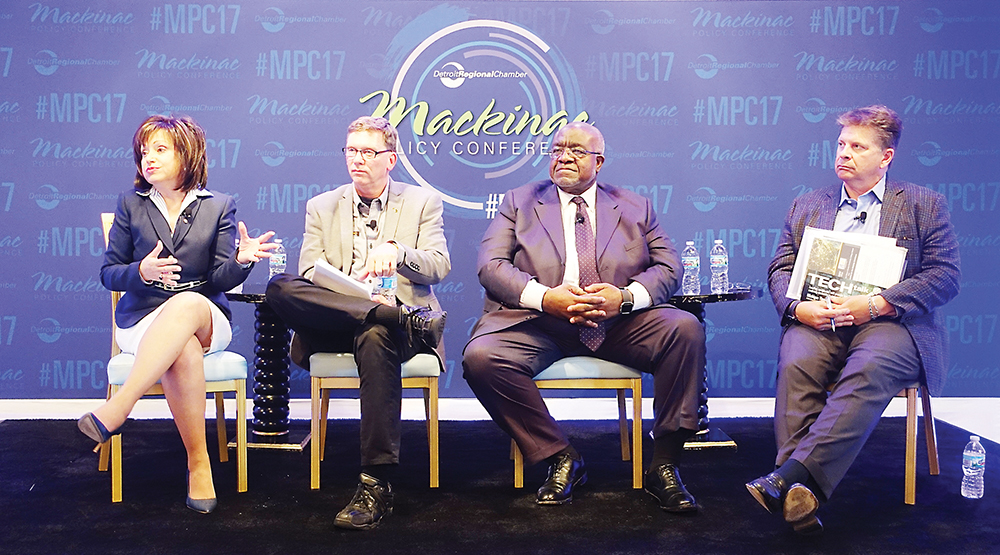
WCC President Dr. Rose B. Bellanca was joined on-stage at the Mackinac Policy Conference by (from left) Roger Curtis, director of the Michigan Department of Talent and Economic Development; Dr. Curtis Ivery, chancellor of Wayne County Community College District; and Paul Krutko, present and CEO of Ann Arbor SPARK.
BY BRENDAN PREBO
AVP, Marketing & Communications
Outside of the Grand Hotel on Mackinac Island, transportation is decidedly low-tech as horse-drawn carriages taxi tourists around the island. Inside the hotel, Washtenaw Community College President Dr. Rose B. Bellanca was discussing the future of transportation with state and industry leaders.
“Changes in the transportation industry are creating challenges and opportunities for employers and professional trades,” Bellanca said during a Mackinac Policy Conference session about the role education will play in creating a talent pipeline for the mobility workforce held on Thursday, June 1.
“This new industry, which we call ‘mobility,’ requires a new set of skills and new jobs that are still emerging, particularly in the areas of IT, advanced manufacturing and supply chain.”
WCC used the 37th annual Mackinac Policy Conference — which tabbed “Winning the Race in Connected Technology” as one of its three pillars — to make a pair of significant announcements regarding its involvement at the new American Center for Mobility (ACM) at Willow Run.
First, the college is leasing space at Willow Run airport adjacent to the ACM’s Ypsilanti Township campus, gaining access to automotive, IT and telecommunications companies working to transform the transportation industry.
Establishing a physical presence at Willow Run will enable WCC to develop and deliver emerging mobility skills gap training, establish apprenticeships in mobility technology, and offer experiential learning opportunities to students.
“Employers want training based on their needs,” said Bellanca. “At Willow Run, we will be focused on customized training and apprenticeships that allow students to earn while they learn. This will enable us to develop opportunities for students working hand-in-hand with industry to ensure our education and training programs meet the needs of employers.”
WCC also announced it is allying with a consortium of community colleges at ACM to focus on skill training for new and incumbent workers, including customized training for employers or university engineering programs.
The consortium will also work on developing career pathways to a certificate or associate degree for skilled professionals or for students planning to transfer to a four-year college or university. Programs for K-12 students in science, technology, engineering and math are being considered as well.
Dr. Curtis Ivery, chancellor of Wayne County Community College District, a member of the community college consortium, joined Bellanca for the Mackinac Policy Conference session. They were joined on the panel by Roger Curtis, director of the Michigan Department of Talent and Economic Development, and the session was moderated by Paul Krutko, president and CEO, Ann Arbor SPARK.
“The skill gap between job training and job requirements is growing,” said Ivery. “Employers are looking for people with multiple skill sets. Even product design and development engineers in the automotive field are being challenged to have more IT and software programming skills.”
Much of the discussion during the session focused on what educators and the state of Michigan must do to get more people trained and educated in professional trades.
“We really need to change the stereotype of the professional trades,” said Curtis. “The skill trade workplace is totally different from the factories of the fifties and sixties. We need to better communicate to students that they can go to school for a couple of years and come out with an associate degree or a certificate earning fifty-to-sixty thousand dollars a year without a huge amount of student debt.”
The state recently re-launched its Going Pro campaign focused on peer-to-peer communications to talk about opportunities in the skilled trades.
“We need to think outside the box and capture young people’s imaginations around what the future jobs will be,” said Krutko.
According to Bellanca, the key to the talent pipeline is making both students and parents aware of the opportunities available in the industry.
“We need to get to the students before middle school,” said Bellanca. “That is why at WCC we have created tech summer camps for teens and younger students. We offer computer programming and robotics courses for ages 8-14. These classes are designed to be fun and interactive, while teaching students Java programming, computer animation and video game design.”
The office at Willow Run is the next step in mobility workforce development for WCC, which opened its Advanced Transportation Center (ATC) in 2015 to meet the needs of transportation and manufacturing professionals to stay compliant, up-to-date and innovative on rapidly developing advanced manufacturing, intelligent transportation, and automotive technology.
